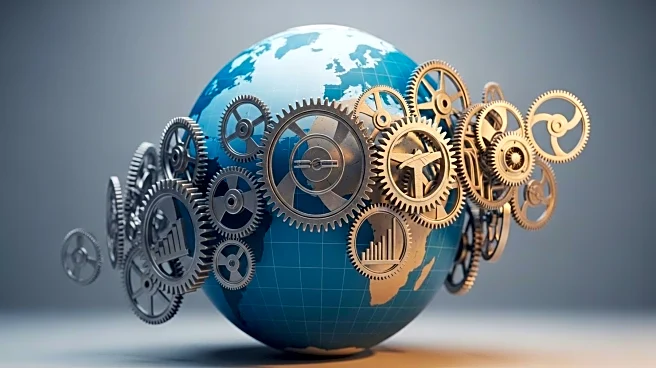What's Happening?
President Trump has imposed steep tariffs on India, affecting significant sectors of the Indian economy. While some products like pharmaceuticals and smartphones are currently exempt, industries such as textiles and garments, which provide mass employment, are facing severe challenges. The textile and garment industry, accounting for millions of jobs and 2% of India's formal economy, has seen a halt in new orders as American buyers prepared for the tariff impact by stockpiling inventories. The Indian stock market reacted negatively, losing value in anticipation of the tariffs. Industry leaders are seeking assistance from the Indian government to mitigate the impact, including financial aid to keep workers employed and reduced loan costs.
Why It's Important?
The tariffs imposed by President Trump have significant implications for the Indian economy, particularly in sectors that are heavily reliant on exports to the U.S. The textile and garment industry, a major source of employment, is facing a crisis due to halted orders and increased costs. This situation could lead to job losses and economic instability in India. The tariffs also strain the trade relationship between the U.S. and India, which had previously been mutually beneficial, with the U.S. being a major importer of Indian goods. The broader impact includes potential shifts in global trade dynamics, as India may seek alternative markets or adjust its economic strategies.
What's Next?
Industry groups in India are urging the government, led by Prime Minister Narendra Modi, to provide support to affected sectors. This includes financial assistance to maintain employment levels and measures to reduce operational costs, such as cheaper electricity. The Indian government may need to negotiate with the U.S. to seek relief or adjustments to the tariffs. Additionally, businesses may explore diversifying their export markets to reduce dependency on the U.S. and mitigate future risks associated with trade policies.
Beyond the Headlines
The tariffs highlight the complexities of international trade relations and the potential for economic policies to disrupt established partnerships. The situation underscores the need for countries to develop resilient economic strategies that can withstand external shocks. It also raises questions about the long-term impact of protectionist policies on global trade and economic growth, as countries may increasingly turn to regional alliances or alternative trade agreements.










